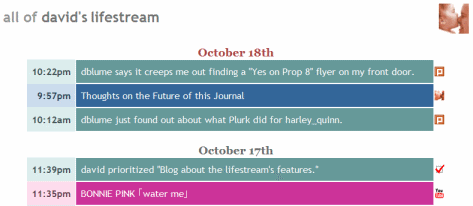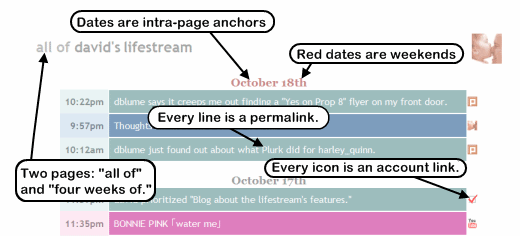The Best Lifestream Ever!
 I'm really proud of my lifestream. Originally I got the idea from Jeremy Keith. (And I use a subset of his style. I intended to use my own style, but I simply love his, and I don't have any design skill.) A lifestream is an aggregation of your user activity feeds from across the internet. Essentially, it can be thought of as an automatic online diary. It writes itself.
I'm really proud of my lifestream. Originally I got the idea from Jeremy Keith. (And I use a subset of his style. I intended to use my own style, but I simply love his, and I don't have any design skill.) A lifestream is an aggregation of your user activity feeds from across the internet. Essentially, it can be thought of as an automatic online diary. It writes itself.I think I can be thought of as a late early-adapter. I thought I had a lot of original ideas as I made my lifestream, but it turns out that more often than not, somebody else had already implemented one of the ideas. Happily, no one seems to have made all the same decisions as me, so my effort wasn't wasted. For me, my lifestream really is the best lifestream ever! Here's why:
[Edit] I changed the icon link. Now they point to a filtered lifestream page.
The Best of Both Worlds
Jeremy implements his as an aggregation of RSS and Atom feeds with no persistent storage of previous entries. So, as newer entries are made, the oldest entries are lost forever. His lifestream is always only the most recent few entries. Jeff, on the other hand, implements his with APIs, so he has access to the complete history of entries for any account. I maintain mine with feeds, but I imported my entire history from many accounts. My lifestream is huge, and spans years, even though I just started it a couple of months ago.
Also The Best of Both Worlds
Jeremy's lifestream is handy, because it never becomes unwieldy. It'll always be about the same size. Jeff Croft's and Emily Chang's persist every entry and thus continuously grow. They paginate their lifestream. You can view page 234 out of 399, for example.
I decided that 98% of the time, I'm only interested in something I wrote down in recent memory. Say, the last four weeks. So I made that the index page of my lifestream. Just the 28 most recent days of my online activity. It make for a nice, small page.
But the other 2% of the time, I'm searching for something older, or I'm feeling nostalgic. So I put my entire lifestream on one page, too. Sure, it's big, and I'll never browse it from a phone, but modern web browsers are perfectly capable of downloading it and rendering it, and will be able to do so for years to come. The entire history really has the same appeal to me as being able to search through a diary.
Even if I decide to paginate it eventually, it'll be easy, the backend will facilitate that.
The Details Matter
Since I provide my entire lifestream on one page, I also made sure to include the year for dates that precede this year. (Eg., October 5th, 2006. Note that that uses the intra-page anchor, another important detail.)
My lifestream has a discoverable RSS feed too.
But you know what? Nobody'd want a feed of a lifestream that constantly updates for individual entries. That's one thing that really bothers me about sweetcron feeds. They're just too noisy. Update, update, update!
So the RSS feed for my lifestream only provides weekly updates. That's what I'd really want from a lifestream feed. Just some sort of nice regular overview of all the activity over a certain period of time. And its permalinks are intra-page links into the huge complete history page.
Some of the accounts that I include in my lifestream don't support user activity feeds. For example, YouTube's feed for each user's Favorited videos doesn't have "date-favorited" information associated with it. Since I wrote my own lifestream engine, I was able to work around that problem. I doubt that most lifestream services like FriendFeed would go to the lengths I did in ensuring that I get exactly the information I want, regardless of whether or not the site's feed or API supports it.
It Helps Me Find Things
Searching for things half-remembered turns out to be pretty successful at the lifestream. I sometimes don't know if I posted a link to delicious, or if I plurked it.
It Encourages Me To Write Better
I always think twice before I write a clever title to a tweet, plurk, or blog entry. I realize now that I may well be searching for that entry in the lifestream later, and the lifestream may only have the title. (The lifestream also contains actual content from the entries, but the content isn't presented in the web pages. So maybe the content will be searchable too, eventually.)
Cleverness is out. Accessibility and searchability are in when you have a persistant searchable lifestream. Now, I strive for clarity in my titles.
I also stopped services that cross-post from one service to another. Having the lifestream made the idea of cross-posting even more redundant. If my livejournal friends don't want to see my tweets, I won't force them to with LoudTwitter.



Comments